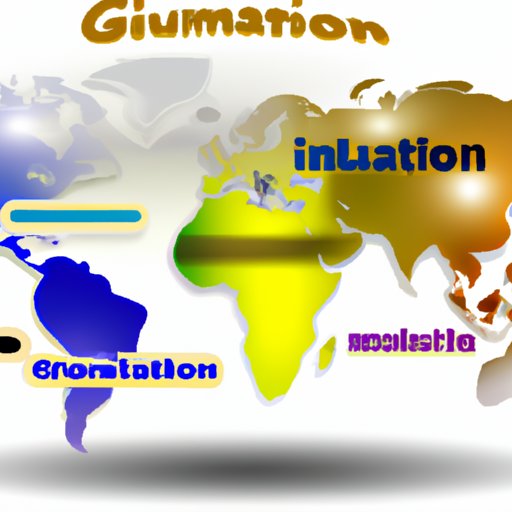Introduction
Globalization is the process by which different societies, cultures, and economies become interdependent through a global network of communication, transportation, and trade. It is often seen as a force for economic growth and development, but it can also have significant impacts on local cultures.
In this article, we will explore how globalization affects culture by examining the impact of globalized media, international trade, multinational corporations, technology, and changing immigration policies. By understanding these dynamics, we can gain insight into how globalization is transforming cultures around the world.
Examining the Impact of Globalized Media on Cultural Identity
The media has long been seen as a powerful tool for shaping public opinion and cultural identity. In an increasingly globalized world, media outlets such as television, radio, and the internet are becoming increasingly international in scope, allowing for greater access to foreign cultures and ideas.
For example, the rise of streaming services like Netflix and Hulu have made it possible for people to watch television shows from around the world. This can lead to an increased appreciation for different cultures and an increased understanding of global issues. It can also lead to a blurring of cultural boundaries as people begin to share common interests and values.
At the same time, globalized media can also be used to promote certain ideologies and values. For instance, media outlets owned or controlled by government or corporate interests may be used to propagate certain political or economic agendas. This can lead to a homogenization of cultural values and the erasure of traditional customs and beliefs.

Exploring How International Trade Impacts Traditional Customs and Values
International trade is another major factor in the globalization of culture. Through the exchange of goods and services across borders, cultures can become more interconnected and influenced by one another.
For example, the spread of fast food chains like McDonald’s and KFC has had a major impact on local diets and culinary customs around the world. Similarly, the proliferation of Western clothing brands has resulted in a homogenization of fashion styles in many countries. These changes can lead to a loss of traditional customs and values.
At the same time, international trade can also lead to the spread of new ideas and practices. For instance, the importation of foreign products can introduce people to new technologies and lifestyles that can improve their quality of life.

Investigating the Influence of Multinational Corporations on Local Cultures
Multinational corporations are businesses that operate in multiple countries. They have a major influence on local cultures due to their ability to shape the economic landscape of a region.
For instance, multinational corporations can exploit local resources, resulting in environmental damage and displacement of communities. They can also pay workers low wages and provide poor working conditions, leading to a deterioration of labor standards. These practices can have a negative impact on local cultures.
At the same time, multinational corporations can also bring benefits to local communities. They can create jobs and stimulate economic growth, as well as providing access to new technologies and consumer goods. These changes can lead to an increased appreciation for different cultures and a better quality of life.

Assessing the Role of Technology in the Spread of Cultural Norms
Technology plays a major role in the globalization of culture. Through advances in communication and transportation, it is now easier than ever for people to travel, migrate, and interact with people from other cultures.
For example, the internet has enabled people to connect with others around the world, allowing them to share ideas and experiences. Social media platforms like Facebook and Twitter have allowed people to communicate with each other across national boundaries and language barriers. This has facilitated the spread of cultural norms and values across countries and continents.
At the same time, technology can also be used to promote certain ideologies and values. For instance, digital media platforms can be used to spread hate speech and propaganda, leading to the erosion of cultural diversity and tolerance.
Analyzing How Changing Immigration Policies Shape Culture Dynamics
Immigration policies play an important role in shaping culture dynamics. By restricting the movement of people across borders, governments can limit cultural exchange and the spread of new ideas and practices.
For example, in recent years, many countries have adopted stricter immigration policies, leading to a decrease in the number of immigrants and refugees. This can lead to a decrease in cultural diversity and a decrease in the appreciation for different cultures. At the same time, looser immigration policies can lead to an influx of new ideas and practices, leading to an increase in cultural exchange.
Conclusion
In conclusion, globalization has had a major impact on culture around the world. Through the spread of globalized media, international trade, multinational corporations, technology, and changing immigration policies, cultures have become increasingly interconnected and influenced by one another.
Understanding these dynamics is essential for gaining insight into how globalization is transforming cultures around the world. By appreciating the positive and negative impacts of globalization on culture, we can better prepare ourselves for the changes it brings.
(Note: Is this article not meeting your expectations? Do you have knowledge or insights to share? Unlock new opportunities and expand your reach by joining our authors team. Click Registration to join us and share your expertise with our readers.)
